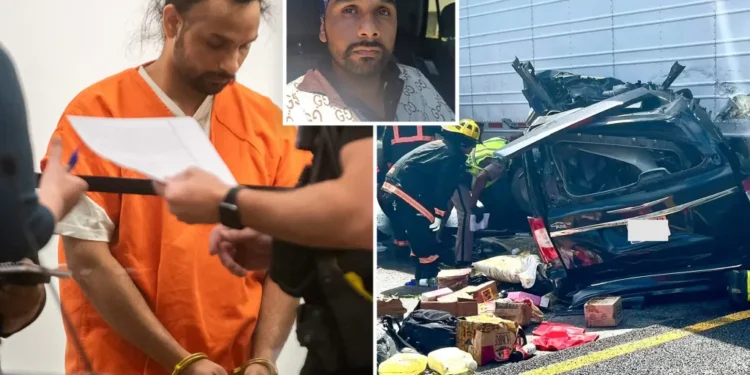More than 2 million people have signed a Change.org petition urging clemency for Harjinder Singh, the Indian-origin trucker facing vehicular homicide charges in Florida after a fatal crash. Public reaction is divided amid debates over justice, immigration policy, and sentencing.

Over 2 Million Signatures Seek Clemency for Indian-Origin Truck Driver After Fatal Florida Crash
A Groundswell of Support Meets Legal and Political Controversy
In the aftermath of a tragic crash on Florida’s Turnpike that claimed the lives of three individuals, a Change.org petition backing Harjinder Singh—a 28-year-old Indian-origin truck driver—has rapidly gained over 2 million signatures, with some estimates surpassing 2.5 million.
The petition, initiated by a group calling itself “Collective Punjabi youth,” appeals to Florida Governor Ron DeSantis and the state’s Board of Executive Clemency to reconsider the charges and sentencing. The petition characterizes the crash as “a tragic accident — not a deliberate act,” urging that “the severity of the charges … does not align with the circumstances of the incident”.
Incident Overview: What Happened and the Legal Fallout
On August 12, 2025, Harjinder Singh allegedly performed an illegal U-turn on Florida’s Turnpike near mile marker 170. This dangerous maneuver obstructed the roadway, leading to a collision in which a minivan slammed into the trailer, killing all three passengers inside.
Singh, who had entered the U.S. illegally in 2018, later acquired a commercial driver’s license in California—despite reportedly failing English and road-sign comprehension tests, according to U.S. Department of Transportation evaluations. This has raised serious questions about licensing protocols in sanctuary states.
He faces up to 45 years in prison, charged with multiple counts of vehicular homicide and related immigration violations. A Florida judge has denied him bail, citing his undocumented status and flight risk, while authorities await further proceedings.
Public Sentiment: Outpouring of Support and Polarizing Backlash
Support and Compassion
Petition supporters argue that the crash was a “terrible mistake” made without intent to harm, calling for justice that includes humanity. Many highlight Singh’s efforts to support his family and view imposing a decades-long sentence as disproportionately harsh.
His home village in Punjab, Rataul, has held prayers for him. Local leaders and political figures—such as Amrinder Singh Raja Warring (Congress) and Sukhbir Singh Badal (Shiromani Akali Dal)—have described the potential punishment as unduly severe, requesting diplomatic assistance.
Critical Backlash
At the same time, critics argue that the petition reveals a misunderstanding of legal principles, noting that clemency should only be considered post-conviction, not prior. Some have condemned the campaign as biased and out of step with the realities of justice.
A counter-petition has also emerged, demanding deportation of those supporting Singh and holding them accountable for undermining public safety and due process.
Broader Ramifications: Immigration, Licensing, and Trucking Policy
Visa and Regulatory Repercussions
The incident has intensified debates over work visas and the qualifications required for commercial drivers. U.S. Secretary of State Marco Rubio announced a suspension of work visas for foreign truck drivers, flagging risks posed by unqualified foreign nationals on American roads.
Accountability and Systemic Reforms
Critics also point to systemic failures—such as how Singh obtained a commercial driver’s license despite failing proficiency tests—as emblematic of broader regulatory lapses in licensing and immigration enforcement.
The case has become a flashpoint in discussions around equitable justice, public safety, and immigration compliance.
Conclusion: A Divisive Case of Justice, Empathy, and Policy
What began as a tragic accident on August 12 has evolved into a highly polarizing controversy. Over 2 million people have rallied in support of Harjinder Singh, contending that genuine justice requires nuance, proportional sentencing, and empathy. Meanwhile, opponents stress the importance of accountability and regulatory integrity.
As Singh’s case progresses through the courts, it stands as a sobering example of how one incident can ignite debate over immigration policy, legal standards, and moral responsibility in modern society.
READ ALSO…….Noida Dowry Death: Nikki Was Told Not to Post Reels or Run a Parlour, Reveals Family 2025















 Categories
Categories









